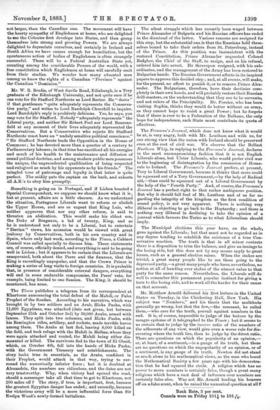The Times publishes a telegram from its correspondent at Khartoum
announcing the total defeat of the Mandi, or False Prophet of the Soudan. According to his narrative, which was brought in by two soldiers and an Arab, Hicks Pasha, with 11,000 Egyptians, was attacked (date not given, but between September 25th and October 3rd) by 30,000 Arabs, armed with lances. They split into two columns, and Hicks Pasha, with his Remington rifles, artillery, and rockets, made terrible havoc among them. The Arabs at last fled, leaving 8,000 killed on the field, and took refuge with the Mandi in Melbas, where they were again attacked and routed, the Mandi being either dis- mounted or killed. The survivors fled to the town of El Obeid, which, on October 4th, fell into the hands of Hicks Pasha, with the Government Treasury and establishments. The story looks true in essentials, as the Arabs, confident in their Prophet, would attack in that way, trying to sur- round the numerically inferior force ; but it is doubted at Alexandria, the numbers are ridiculous, and the dates are not very trustworthy. Why, when victory had opened the road, should a messenger take all that time to get to Khartoum, not 200 miles off P The story, if true, is important, first, because the greatest Egyptian danger has ended ; and secondly, because the victorious army will be a more influential force than Sir Evelyn Wood's newly-formed battalions.






































 Previous page
Previous page